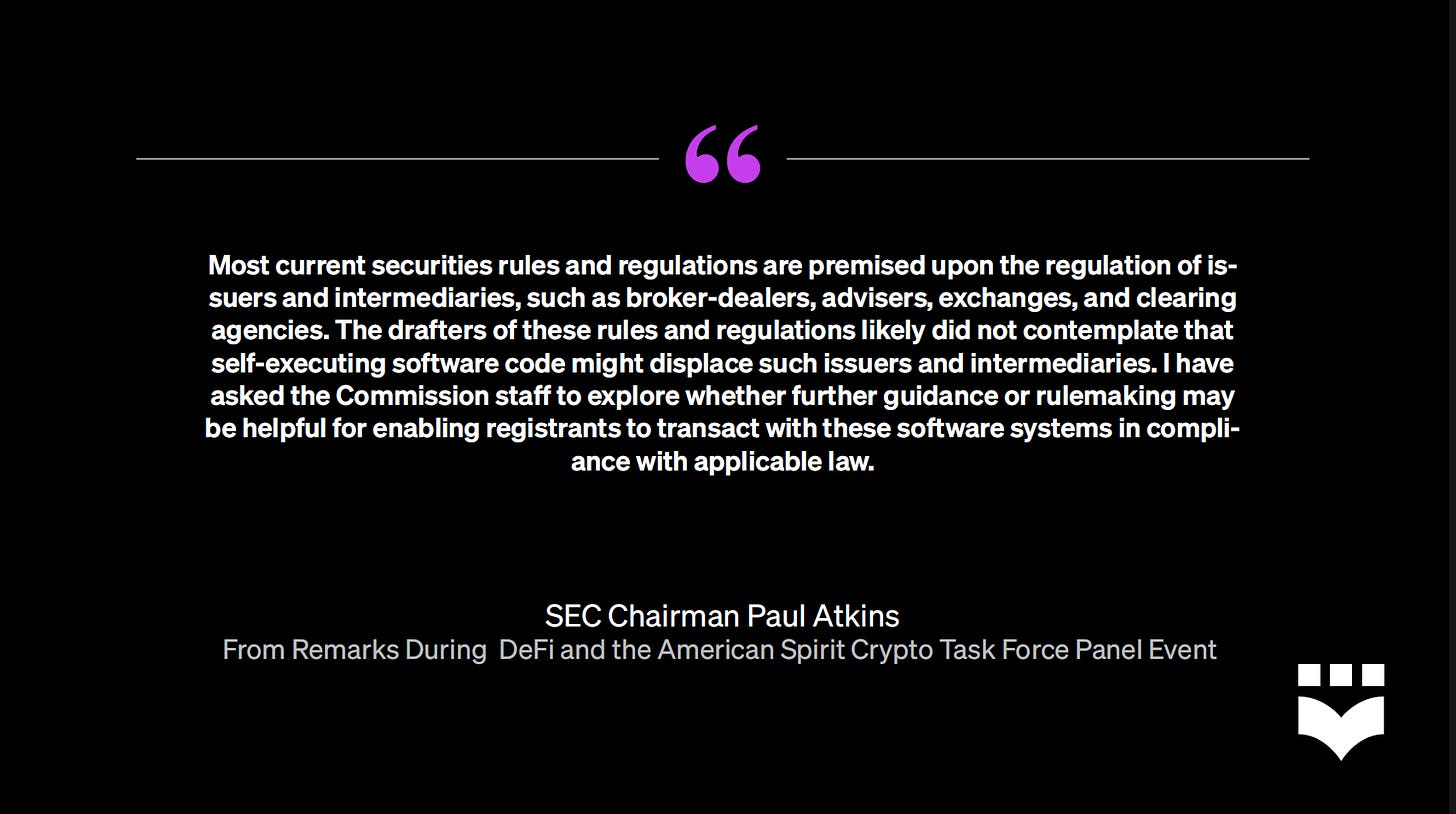The DeFi Debrief
Week of June 16, 2025: SEC Roundtable on DeFi; CLARITY Act Markup; CFTC Nomination Hearing; DEF Submits Expert Opinion in Alexey Pertsev Trial; SEC Drops "Exchange" Rulemaking; GENIUS Act Update
SEC Crypto Task Force Hosts Roundtable on DeFi
On June 9, 2025, the Securities and Exchange Commission (SEC) Crypto Task Force hosted its final roundtable event titled “DeFi and the American Spirit.” The roundtable brought together voices from across the digital assets industry to discuss the future of digital assets regulation and how DeFi technology aligns with American values.
The event featured opening statements from the SEC Chairman and Commissioners, followed by a panel discussion with experts from across the DeFi industry. DEF was represented by Board Member Rebecca Rettig, Chief Legal Officer at Jito Labs, and Michael Mosier, Managing Partner at Arktouros. Other panelists included Jill Gunter from Espresso Systems, Michael Jordan from DBA, Omid Malekan of Columbia Business School, Gabe Shapiro of MetaLeX, Peter Van Valkenburgh of Coin Center, Erik Voorhees of Venice AI, and Kevin Werbach from the Wharton School of Business.
SEC Chairman Paul Atkins opened the event stating, “American values of economic liberty, private property rights, and innovation are in the DNA of DeFi.” Atkins signaled a bright future for DeFi, and gave a strong endorsement of self-custody rights.
Former Commissioner Troy Paredes moderated the panelist discussion. During the conversation, Rettig defined decentralization as “a philosophy that generally espouses movement away from power, authority, or control being centralized with one entity or one actor and moving towards a disintermediation or a dislocation of both actors, jurisdictions, and other dispersions of the concept of power or control." Mosier highlighted the differences between DeFi and traditional finance, noting: “Data communications is not the same as financial activity.”
The panel concluded with a commanding statement by Erik Voorhees on the power of DeFi:
“No matter what, we are all subjective humans, and we make mistakes, and are squishy in our points of view. Smart contracts are not squishy; they execute exactly according to the code … And so, far from being a tool of anarchy, cryptocurrencies, blockchains, and DeFi should be seen as a tool of ultimate order, and that is a very different perspective that is worth noting.”
DEF commends the SEC for affirmatively engaging with the DeFi industry and facilitating such a productive discussion. DEF looks forward to further conversation on how to improve the current regulatory framework to promote DeFi innovation in the United States.
Chair Atkins Proposes DeFi “Innovation Exemption”
Also during the DeFi Roundtable, Chairman Atkins recognized the absence of intermediaries in DeFi software and mentioned an “innovation exemption” from securities laws for software developers. In his welcome speech, Atkins dissented from the previous Administration's actions of holding blockchain developers liable for the actions of third parties, stating:
“Engineers should not be subject to the federal securities laws solely for publishing this type of software code. As one court put it, it would be irrational to hold the developer of a self-driving car liable – here, quoting from the court’s decision – 'for a third-party’s use of the car to commit a traffic violation or to rob a bank. In those circumstances, one would not sue the car company for facilitating the wrongdoing; they would sue the individual who committed the wrong.”
Atkins continued: “I do not believe that we should allow a century-old regulatory framework to stifle innovation with technologies that could upend and most importantly improve and advance our current traditional intermediated model. We should not automatically fear the future.”
Atkins signaled support for a conditional “innovation exemption” for developers creating DeFi protocols. The Chairman shared that he was exploring options and had instructed his staff to look into how the Commission's rules could be amended to provide such an exemption, which would, in theory, allow developers to bring decentralized technologies to market with less fear of being subject to regulation better suited for centralized financial intermediaries.
For some relevant background: there have been past proposals from Commissioners that suggested utilizing the Commission’s ability to provide exemptive relief to DeFi projects, including Commissioner Hester Peirce’s Token Safe Harbor proposal. In this, she proposed a nonexclusive safe harbor for projects intending to decentralize. In April 2025, DeFi Education Fund proposed Guiding Principles for a Token Safe Harbor to the Crypto Task Force.
For more analysis on a conditional exemptive relief framework for DeFi under the Exchange Act, see Khurram Dara’s blog post: “The case for scoping out (much of) defi from the Exchange Act.”
House Committees Advance Digital Asset Market Structure Legislation
On June 10, 2025, the House Financial Services Committee (HFSC), chaired by Rep. French Hill (R-AR), held a full committee markup and voted 32-19 to advance H.R. 3633, the Digital Asset Market Clarity (CLARITY) Act, to the floor of the House of Representatives. Earlier the same day, the House Agriculture Committee advanced the CLARITY Act with a resounding bipartisan vote of 47-6 to move the legislation out of committee.
The CLARITY Act defines key terms, introduces criteria to determine when a decentralized “blockchain system” may be certified as “mature,” and delineates jurisdiction between the CFTC and SEC with respect to digital assets and capital raising transactions. The bill also imposes certain consumer protection and disclosure requirements on centralized intermediaries while offering exemptions for certain DeFi activities.
Importantly, the most recent iteration of the CLARITY Act includes select provisions from the Blockchain Regulatory Certainty Act (BRCA) in Section 110 – legislation that protects developers of non-custodial, peer-to-peer software protocols from being mischaracterized as financial intermediaries.The inclusion of BRCA provisions reflects the collective efforts of a broad coalition of stakeholders advocating for clear, innovation-friendly policy for decentralized finance.
Throughout the HFSC markup, several amendments proposed focused on DeFi, including anti-money laundering (AML) provisions and the establishment of an AML DeFi sandbox. However, none of the DeFi-focused amendments were adopted by the committee.
Next up, both versions of the CLARITY Act await alignment. The versions of the CLARITY Act passed by the HFSC and the House Agriculture Committee are both Amendments in the Nature of a Substitute (ANS), which indicates that each committee has substituted the original text with a new draft. For the CLARITY Act to advance to a full vote on the House floor, one unified version must be adopted by both committees and advanced by the House Rules Committee.
Crypto, Commodities, and Confirmation: Senate Ag Reviews CFTC Nominee
On June 10, 2025, the Senate Agriculture Committee held a nomination hearing for Brian Quintenz to serve as Chairman of the Commodity Futures Trading Commission (CFTC). Quintenz is the former Head of Policy for A16z crypto and was commissioner of the CFTC from 2017-2021.
During the hearing, Senators asked Quintenz several questions on digital asset regulation. Quintenz emphasized a technology-first, principles-based approach, and defended the CFTC’s self-certification process. He called for clear legislative direction to support innovation while ensuring oversight.
Next up, the Senate Agriculture Committee will continue to review and then vote on advancing Quintenz’s confirmation to the full Senate floor.
DEF strongly supports the confirmation of CFTC Chairman-Designate Quintenz. The CFTC plays a critically important role in the future of digital assets regulation in the United States, especially considering that proposed market structure frameworks (e.g., the CLARITY Act) would provide CFTC with authority over certain digital asset spot markets.
DeFi Education Fund and Coin Center Submit Expert Opinion in Alexey Pertsev’s Trial
On June 12, 2025, DeFi Education Fund and Coin Center submitted an expert opinion to the Dutch court handling Alexey Pertsev’s appeal in his criminal case in the Netherlands. The brief addresses key technological aspects of the Tornado Cash Protocol and privacy-related software tools.
In the submission, DEF and Coin Center elaborate on the potential unintended consequences of software developers being held liable for third-party misconduct. DEF and Coin Center express that the keystone of decentralized finance is disintermediation—and note that DeFi could have tremendous societal and individual benefits with the appropriate regulatory frameworks.
To read the full brief, please click here.
SEC Officially Drops “Exchange” Rulemaking
On June 12, 2025, the Securities and Exchange Commission (SEC) officially dropped their proposed “exchange” rulemaking, ending a failed attempt to expand the law beyond its statutory limits by capturing decentralized trading protocols under the proposed regulation. The proposed rule was fundamentally incompatible with DeFi technology; it would have required DeFi protocols and software developers to register as trading systems, which would have been inappropriate and in some cases, impossible. The 2022 proposal aimed to expand the definition of exchange to cover vastly more crypto projects and participants in DeFi. DEF filed three comment letters relating to the proposed rule in April 2022, June 2022, and June 2023.
For background on our advocacy on this matter - read our thread here. DEF is grateful to the SEC for recognizing the technological realities of decentralized networks.
The GENIUS Act Advances
On June 12, 2025, the Senate convened for four procedural votes on the GENIUS Act, adopting Senator Bill Hagerty’s (R-TN) amended bill text (ANS) and advancing it to a final floor vote. After the procedural votes, the legislation is set to be voted on for final passage this week, as soon as Tuesday, June 17.
DEF strongly believes regulatory clarity for stablecoins is in the best interest of the U.S. dollar, American consumers, and small businesses, and we encourage continued bipartisan support to move this important legislation forward.











